
Jyotirao Govindrao Phule, also known as Jyotiba Phule, was an Indian social activist, businessman, anti-caste social reformer and writer from Maharashtra.
Marathi literature is the body of literature of Marathi, an Indo-Aryan language spoken mainly in the Indian state of Maharashtra and written in the Devanagari and Modi script.
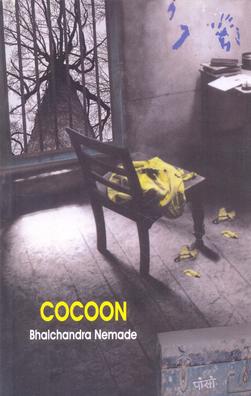
Kosala, sometimes spelled Kosla, is a Marathi novel by Indian writer Bhalchandra Nemade, published in 1963. Regarded as Nemade's magnum opus, and accepted as a modern classic of Marathi literature, the novel uses the autobiographical form to narrate the journey of a young man, Pandurang Sangvikar, and his friends through his college years.
Narayan Vaman Tilak was a Marathi poet from the Konkan region of then Bombay Presidency in British India, and a famous convert to Christianity from Chitpavan Brahmin Community.
Gopal Nilkanth Dandekar aka Appa Dandekar was a Marathi writer from Maharashtra, India.

Hari Narayan Apte was an Indian Marathi language writer.
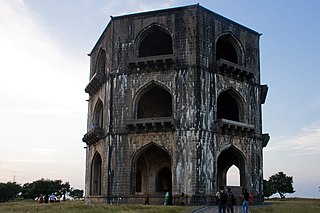
Ahmednagar district, officially Ahilyanagar district, is the largest district of Maharashtra state in western India. The historical city of Ahmednagar is the headquarters of the district. Ahmednagar and Sangamner are the largest cities in the district. It was the seat of the Ahmednagar Sultanate of late medieval period. This district is known for the towns of Shirdi associated with Sai Baba, Meherabad associated with Meher Baba, Shani Shinganapur with Shanidev, and Devgad with Lord Dattatreya. Ahmednagar district is part of Nashik Division. The district is bordered by Aurangabad district to the northeast, Nashik district to the northwest, Thane and Pune districts to the southwest, Solapur district to the south and Beed district to the southeast.

Deccan College Post-Graduate and Research Institute, also referred to as Deccan College, is a post-graduate institute of Archeology, Linguistics and Sanskrit & Lexicography in Pune, India.
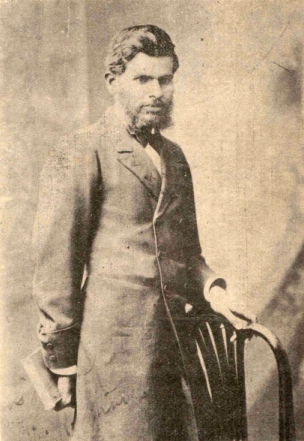
Vitthal Ramji Shinde was a revered social reformer, researcher, writer, and proponent of anti-untouchability activism and religious unity in Maharashtra, India. He played a prominent role among liberal thinkers and reformists before India gained independence. Shinde is recognized for his tireless efforts in fighting against the practice of ‘untouchability’ and advocating for support and education for ‘untouchables,’ including Dalits.
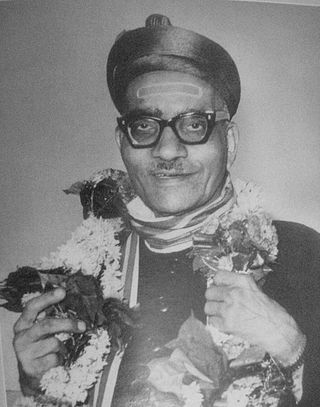
Dattatray Vaman Potdar, better known as Datto Vaman Potdar, was an Indian historian, writer, and orator. He was the Vice-Chancellor of University of Pune during 1961 - 1964.

Shridhar Venkatesh Ketkar was a Marathi sociologist, historian and novelist from Maharashtra, India. He is principally known as the chief editor of Maharashtriya Jnanakosha, the first-ever encyclopedia in the Marathi language.

Marathi Christians are an ethnoreligious group of the Indian state of Maharashtra who accepted Christianity during the 18th and 19th centuries during the East India Company, and later, the British Raj. Conversions to Protestantism were a result of Christian missions such as the American Marathi Mission, Church Mission Society and the Church of England's United Society for the Propagation of the Gospel.

Christianity is a minority religion in Maharashtra, a state of India. Approximately 79.8% of the population of Maharashtra are Hindus, with Christian adherents being 1.0% of the population. The Roman Catholic archdiocese whose seat is in Maharashtra is the Roman Catholic Archdiocese of Bombay. There are two different Christian ethnic communities in Maharashtra: the Bombay East Indians, who are predominantly Roman Catholic, and the Marathi Christians, who are predominantly Protestant with a small Roman Catholic population.

Ramabai Ranade was an Indian social worker and one of the first women's rights activists in the early 20th century. At the age of 11, she was married to Justice Mahadev Govind Ranade, who was a distinguished Indian scholar and social reformer.

John Wilson FRS was a Scottish Christian missionary, orientalist, ethnographer, and Christian minister. He was the member of The Royal Society of London for Improving Natural Knowledge.
James Thomas Molesworth was a military officer in the services of the British East India Company, and one of the most prominent lexicographers of the Marathi language.

Anant Yashwant Khare was an Indian writer and a civil engineer. He wrote on scientific, sociological and economic subjects in the Marathi language. He published around twenty-five books, including a novel titled Udya, published in 2014 which is recognised one of the prominent writings in Marathi literature.
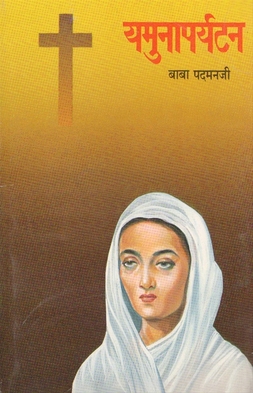
Yamuna Paryatan is a Marathi novel written by Marathi Christian missionary Baba Padmanji. It was published in 1857. The book praises the teachings of Christianity by describing the miserable condition of Hindu widows in the nineteenth century AD. Yamuna Paryatan was among the earliest novels written in India. It had a female-centric theme, which addressed the issue of women's condition in Hindu society. It gained nationwide attention due to the topic it discussed. It is also known for being the first vernacular-Marathi novel.
Moro-bhatt Dandekar was a Hindu pandit and apologist from Bombay, British India. In response to Christian missionary activities, he wrote the Marathi-language Hindu apologetic work Shri-hindu-dharma-sthapana (1831) and published the monthly magazine Upadesha-Chandrika (1844).
Svadesha-dharmabhimani is an 1834 Marathi-language Hindu apologetic text by Narayan Rao of Satara, British India.















